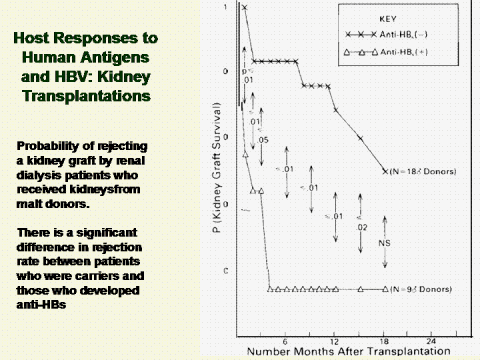 |
W. Thomas London,
Jean Drew, Edward Lustbader and others in our laboratory have undertaken an
extensive study of the patients in a large renal dialysis unit in
Philadelphia. The renal patients can be characterized on the basis of their
response to infection with hepatitis B. Patients who develop antibody to
HBsAg are significantly more likely to reject transplanted kidneys that are
not completely matched for HLA antigens than patients who become carriers of
HBsAg (Fig. 5). Since many of the patients became exposed to hepatitis B
while on renal dialysis, their response to infection can be determined prior
to transplantation. In this patient population there is a correlation
between development of anti-HBs and the subsequent development of anti-HLA
antibodies after transplantation. We have also found a correlation between
the development of anti-HLA and anti-HBs in transfused hemophilia patients
and in pregnant women. Hence, there appears to be a correlation between the
response to infection with HBV and the immunologic response to polymorphic
human antigens in tissue transplants. Further, from preliminary studies it
appears that donor kidneys from males are much more likely to be rejected by
patients with anti-HBs than by patients without anti-HBs. These differences
were not observed when the kidneys were from female donors. Dr. London is
now extending his observations to other transplants, in particular, bone
marrow, to determine whether a similar relation exists. |
